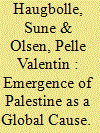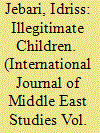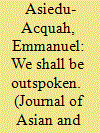|
|
|
Sort Order |
|
|
|
Items / Page
|
|
|
|
|
|
|
| Srl | Item |
| 1 |
ID:
191925


|
|
|
|
|
| Summary/Abstract |
In the late 1960s, Palestine became an iconic signifier of solidarity and support for the Left, but also a transgressive tool that shaped and re-situated ideological positions at domestic levels. In this article, we attempt to answer why, how, and when this happened. Most research to date has stressed the global diplomatic offensive by the PLO (Palestine Liberation Organization). Palestinian revolutionary thought and action are obviously the primary explanatory factors for the emergence of their cause internationally. However, a one-sided approach blurs the agency of the global revolutionaries and solidarity activists who helped elevate Palestine to a global cause. This article takes a comparative approach and uses Denmark and Norway as two illustrative examples of Palestine’s transformation into a global leftist cause. Denmark and Norway are central cases because solidarity movements in Scandinavia developed early on, and because they exemplify how Fatah, in Norway, and the Popular Front for the Liberation of Palestine (PFLP), in Denmark, advanced different models of solidarity and cultural diplomacy. We compare these two cases with new evidence from other countries in order to summarize how a cultural transfer of symbols, interpretations, experiences, and ideological positioning took place in the 1960s and 1970s through meetings, translations, and organizational links.
|
|
|
|
|
|
|
|
|
|
|
|
|
|
|
|
| 2 |
ID:
184212


|
|
|
|
|
| Summary/Abstract |
The alliance between the leftist movement Perspectives Tunisiennes and university students delivered sustained opposition and repeated protests against Bourguiba's regime in the 1960s and 1970s. This article argues that these groups were driven by the “student question,” a counterproject for Tunisian national development that opposed the vision of liberal bourgeois modernity espoused by Bourguiba's reforms of elitism through education and depoliticization. Instead, the student question was fleshed out in the group's periodical, envisaging the emancipation of Tunisian subjects and their entitlement to citizenship and political participation, and how the struggle of students would sweep the whole country. Drawing on the movement's journal and memoirs of four former Tunisian leftists, I trace how Perspectives navigated the regime's repression in 1968 and 1972–75, and how two successive generations of leftists emerged with different ideological reference points. In so doing, this article takes seriously the political imagination of this group during the global 1960s and 1970s, while conceiving ways to reintegrate silenced memories and histories into the mainstream of Tunisian historiography after the 2011 revolution.
|
|
|
|
|
|
|
|
|
|
|
|
|
|
|
|
| 3 |
ID:
164378


|
|
|
|
|
| Summary/Abstract |
This paper looks at student political activism in Ghana in the late 1950s and 1960s. Using Ghanaian and British archives, it examines how students of Ghana’s universities politically engaged with the government of Kwame Nkrumah and his ruling Convention People’s Party (CPP). Student activism manifested most in the conflict between the Nkrumah government, on one hand, and university authorities and students, on the other hand, over the purpose of higher education, university autonomy, and nationalism. The conflict coalesced around the idea of educated youth as model citizens. Contrary to the denial in existing literature, the paper argues that a nascent student movement and tradition of student political activism had emerged since the late 1950s. University student activism established itself as a fulcrum of the country’s evolving postcolonial political order and a bulwark against governmental authoritarianism. In the larger context of the global 1960s, Ghanaian student activism belonged to the wave of youth protests against governments that favored stability and opposed all dissent.
|
|
|
|
|
|
|
|
|
|
|
|
|
|
|
|
|
|
|
|
|